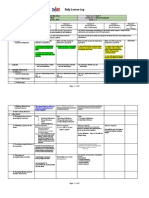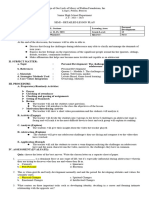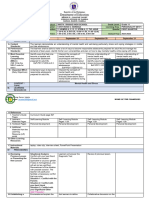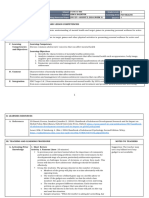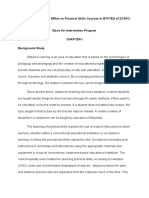0 ratings0% found this document useful (0 votes)
145 viewsPerdev 03-06-2023
The document is a daily lesson plan for a Personal Development class discussing how to deal with "adulting" or transitioning into adulthood. The lesson plan aims to help students (1) understand the physical and psychological changes of adolescence, (2) examine challenges faced by adolescents, and (3) acknowledge different challenges and how to address them. Students will participate in individual and paired activities to identify developmental tasks, differentiate childhood and adolescence, discuss rules for responsible adolescence, and evaluate statements about adolescent development. The goal is for students to apply lessons to their daily lives and responsibilities.
Uploaded by
Ryan Paul Espejo VallejosCopyright
© © All Rights Reserved
Available Formats
Download as DOCX, PDF, TXT or read online on Scribd
0 ratings0% found this document useful (0 votes)
145 viewsPerdev 03-06-2023
The document is a daily lesson plan for a Personal Development class discussing how to deal with "adulting" or transitioning into adulthood. The lesson plan aims to help students (1) understand the physical and psychological changes of adolescence, (2) examine challenges faced by adolescents, and (3) acknowledge different challenges and how to address them. Students will participate in individual and paired activities to identify developmental tasks, differentiate childhood and adolescence, discuss rules for responsible adolescence, and evaluate statements about adolescent development. The goal is for students to apply lessons to their daily lives and responsibilities.
Uploaded by
Ryan Paul Espejo VallejosCopyright
© © All Rights Reserved
Available Formats
Download as DOCX, PDF, TXT or read online on Scribd
You are on page 1/ 2
School KABACAN NATIONAL HIGH SCHOOL
DAILY LESSON Teacher RYAN PAUL E. VALLEJOS
PLAN Learning Area PERSONAL DEVELOPMENT
Quarter THIRD QUARTER
Date & Time MARCH 07, 2023
Grade & Section 11 HUMSS – 10
Time TUESDAY - FRIDAY
9:30 AM – 10:15 AM
I. OBJECTIVES :
A Learning Competency Code EsP-PD11/12DS-Id-3.3
Learning Competency/Objectives The learners demonstrate an understanding of the skills and tasks and challenges
appropriate for middle and late adolescence, preparatory to early adulthood.
a. Explain the importance of addressing the physical and psychological changes brought
about by adolescence,
b. Examine the challenges presented to adolescents pertaining to the physical and
psychological areas.
c. Acknowledge the different types of challenges that adolescents have to face and the
means of addressing them.
CONTENT ADULTING 101: HOW TO DEAL WITH ADULTING
III LEARNING RESOURCES
A References
1. Teacher’s Guide pages
2. Learner’s Materials pages Personal Development – Module 4: How to Deal with Adulting
3. Textbook pages
4. Additional Materials from Learning
Resource (LR)portal
B Other Learning Resource
IV. PROCEDURES
A Reviewing previous lesson or The students will be asked to answer the following:
presenting the new lesson Which of the following are developmental tasks for Adolescence? There are five (5)
correct answers.
A. Achieving emotional independence of adults
B. Preparing for marriage and family life
C. Achieving personal independence
D. Developing acceptable attitudes toward society
E. Preparing for an economic career
F. Acquiring values and an ethical system to guide behavior
G. Desiring and achieving socially responsible behavior
B Establishing a purpose for the lesson Individual Activity: Read each item carefully and identify either the following activities are
PHYSICAL, SOCIAL or PERSONAL.
____________1. having a sense of who you are
____________2. exercising
____________3. sharing feelings
____________4. Accepting disappointments, defeats, losing, and rejections
____________5. saying NO to alcohols and smoking
____________6. Standing up for yourself
____________7. Accepting yourself
____________8. Introducing yourself and others
____________9. Forgiving yourself when needed
____________10. Healthy diet
____________11. Trusting others
____________12. Personal hygiene
____________13. Being trusted
____________14. Keeping in shape
____________15. Feeling good about yourself
Objectives will be presented after the activity.
C Presenting examples/Instances of The students will choose their pairs and will be asked to share their answers on the
the new lesson following questions:
1. Differentiate your childhood years with your adolescent years. Which stage is more
challenging? Why?
2. Have you encountered challenges while being an adolescent? How did you address
those challenges?
D Discussing new concepts and Eight (8) simple rules which could help you, teenagers, to become a responsible
practicing new skill # 1 adolescent who is prepared for adult life:
1. Focus on your studies and do well in all of your endeavours. There is time for
everything.
2. Take care of your health and hygiene. Healthy body and mind are important as you
journey through adolescence.
3. Establish good communication and relation with your parents or guardian. Listen to
them. This may be easier said than done at this stage, but creating good relationship with
them will do you good as they are the ones you can lean on especially in times of trouble.
4. Think a lot before doing something. Evaluate probable consequences before acting.
Practice self-control and self-discipline.
E Discussing new concepts and 5. Choose to do the right thing. There are plenty of situations in which it is better to use
practicing new skills # 2 your mind rather than your heart.
6. Do your best to resist temptations, bad acts, and earthly pleasures and commit to
being a responsible adolescent.
7. Respect yourself. You are an adult in the making. Do not let your teenage hormones
get into you. If you respect yourself, others will respect you too.
8. Be prepared to be answerable or accountable for your actions and behavior. It is a part
of growing up and becoming an adult.
F Developing mastery Individual Activity: Identify the following statements. Write P for personal, E for Emotional,
S for Social and M for Mental.
1. May stress over school and test scores.
2. Starts to develop moral ideas and to select role models
3. Explores romantic and sexual behaviors with others.
4. Is more aware of social behaviors of friends.
5. Seeks privacy and time alone.
G Finding practical application of How will you apply the 4 types of development in your daily task/ activity that will help you
concepts and skills in daily living in becoming a responsible adolescent?
H Making generalizations and The students will be asked to answer the following questions:
abstractions about the lesson 1. What have you learned from the lesson?
2. What are the important key notes that you have remembered?
I Evaluating learning Instructions: Write TRUE if the statement is correct and FALSE if otherwise.
1 Stress is a common psychological concern among adolescents.
2. Family associations are important in adolescent development.
3. Female adolescents are more concerned about weight.
4. The transition from high school to college/ work is not a bigger responsibility for
adolescents.
5. Adolescents do not ask independence from parents.
6. Most girls have completed the physical changes related to puberty by age 15.
7. In the adolescence stage, friends become more important.
8. They maybe influenced by peers to try risky behaviors (alcohol, tobacco, sex)
9. They have a better understanding of complex problems and issues.
10. They start to have more intellectual interests.
J Additional activities for application or Write a slogan or personal declaration on how you can be committed to your self-
remediation development.
V. REMARKS
VI. REFLECTION
A No. of learners who earned 80% in the
evaluation
B No. of learners who require additional
activities for remediation who scored
below 80%
C Did the remedial lessons work? No. of
learners who have caught up with the
lesson
D No. of learners who continue to require
remediation
E Which of my teaching strategies worked ____Direct Teaching ____Simulation
____Inquiry Approach ____Demonstration by teacher,
well? Why did these work? ____Lecture-discussion demonstration by students
____Cooperative learning ____Lecture and student recitation
____Hands-on/ individual or group practice
Why did these work?
____Cooperation among students in group activities
____Availability of instructional devices
____Availability of instructional materials
____Used of well-prepared instructional materials
____Availability of downloaded material from the net
F What difficulties did I encounter which my ____Lack of preparation on the part of the teacher ____Students lack of attention during the explanation
____Inability of students to express themselves ____Failure to do homework
principal or supervisor can help me
____Learning difficulty among some of the students ____Students behavior/ attitude
solve? ____Unavailability of instructional devices/audio-visual materials ____ Students behavior/ attitude
____Used of poorly prepared instructional materials
____Used of inappropriate strategy in teaching strategy
____Uncooperative students in group activities ____Learning difficulty among some of the students
G What innovation or localized materials did ____Contextualization (Indigenization) of some contents
____Utilization of own LCD and laptop in teaching
I use/discover which I wish to share with ____Download learning materials from the internet
other teachers? ____Utilization of multimedia in teaching
Checked by: Noted: Approved:
CATHERINE D. VILLANUEVA, MT-II HIYASMIN A. LUMANGGAL, P-I MARY JOY D. BAUTISTA, PhD
Subject Specialist Assistant Principal for SHS School Principal
You might also like
- What Did You Ask At School Today: A Handbook Of Child Learning Book 1From EverandWhat Did You Ask At School Today: A Handbook Of Child Learning Book 15/5 (2)
- Personal Development 1 July 1 and 3 WEEK 2No ratings yetPersonal Development 1 July 1 and 3 WEEK 25 pages
- Quarter 1 - Week 3 Devt_l Stages & ChallengesNo ratings yetQuarter 1 - Week 3 Devt_l Stages & Challenges11 pages
- Lesson Plan PERDEV Coping With Stress in Middle and Late AdolescenceNo ratings yetLesson Plan PERDEV Coping With Stress in Middle and Late Adolescence8 pages
- Daily Lesson Log in Personal Development: ST STNo ratings yetDaily Lesson Log in Personal Development: ST ST2 pages
- Koronadal National Comprehensive High School100% (1)Koronadal National Comprehensive High School3 pages
- Q1 PPT - Pe and Health 7 - Week 1 - Lesson 1No ratings yetQ1 PPT - Pe and Health 7 - Week 1 - Lesson 138 pages
- ATG4-Developmental Task and Challenges being Experience during AdolescentNo ratings yetATG4-Developmental Task and Challenges being Experience during Adolescent3 pages
- The Learners: The Learners: The LearnersNo ratings yetThe Learners: The Learners: The Learners3 pages
- 24by09in00002376 - Sky Ventureszdup - 27-07-2024No ratings yet24by09in00002376 - Sky Ventureszdup - 27-07-20242 pages
- Welcome: Puskesmas Iv Denpasar Selatan (Public Health Centre)No ratings yetWelcome: Puskesmas Iv Denpasar Selatan (Public Health Centre)33 pages
- Module-2 Notes Biology For Engineers....No ratings yetModule-2 Notes Biology For Engineers....14 pages
- Solved If The Cubic Total Cost Function Described in The TextNo ratings yetSolved If The Cubic Total Cost Function Described in The Text1 page
- Brand Awareness & Preference Regarding Havells Green CFL PDF100% (1)Brand Awareness & Preference Regarding Havells Green CFL PDF74 pages
- Distance Learning and Effect On Practical Skills Courses in BTVTED of ZCSPCNo ratings yetDistance Learning and Effect On Practical Skills Courses in BTVTED of ZCSPC12 pages
- Jingjiao The Church of The East in China and Central AsiaNo ratings yetJingjiao The Church of The East in China and Central Asia711 pages
- Infection Prevention and Control (IPC) For COVID-19 VirusNo ratings yetInfection Prevention and Control (IPC) For COVID-19 Virus21 pages
- KDS 14 20 64 Design Standard For Structural Plain ConcreteNo ratings yetKDS 14 20 64 Design Standard For Structural Plain Concrete11 pages
- Instant download Straight Talk About Communication Research Methods 3rd Edition Christine S Davis pdf all chapter100% (9)Instant download Straight Talk About Communication Research Methods 3rd Edition Christine S Davis pdf all chapter85 pages












